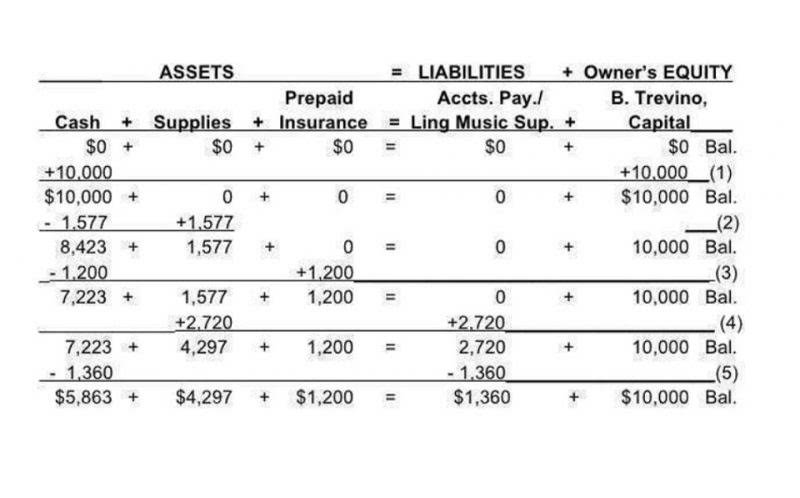
Public viewpoints on overhead expenses hurt the nonprofit industry a great deal. Overhead includes those expenses that nonprofits use to cover administrative costs, market their mission for fundraising, and pay for other internal expenses that help the organization grow. Essentially, overhead expenses are those that nonprofits use to pay for anything that isn’t a program directly related to the organization’s mission. This nonprofit accounting statement breaks down the operating, financing, and investing activities to show how cash moves at the organization. You can easily see how your nonprofit uses the funding it receives from fundraising, grant seeking, and other revenue streams by analyzing this statement.

Statement of Functional Expense

Essentially, you should view bookkeeping as the financial oversight process that’s necessary for operating your nonprofit daily. For example, bookkeeping ensures your nonprofit uses its revenue wisely and maintains its tax-exempt status. Accounting, on the other hand, is using that information to provide a detailed analysis of your finances. In other words, effective bookkeeping practices will accurately record and monitor your financial activity throughout the fiscal year. When the time comes to report your financial activity or make a budgetary decision, you’ll be equipped with precise and thorough information.
To Hire or Outsource for Nonprofit Accounting
Kristine Ensor is a freelance writer with over a decade of experience working with local and international nonprofits. As a nonprofit professional she has specialized in fundraising, marketing, event planning, volunteer management, and board development. AccuFund is an excellent resource for nonprofits looking for a reliable financial management tool. As your nonprofit grows and steps out into more complicated financial projects, AccuFund lets you purchase tools that fit your organization’s needs.

What Does a Nonprofit Bookkeeper Do?
- The easiest way to do this is with quality accounting software that helps create standardized reports.
- Your nonprofit’s donors have the right to set restrictions on the donations they contribute to your organization and grant funders want to make sure their funds are spent on the agreed-upon programs.
- If the IRS approves, nonprofits will be tax-exempt, while for-profits will be subject to income taxes.
- These financial statements can provide helpful insight into your nonprofit’s financial health so that you can adjust accordingly and plan your next moves.
- Invoices should include a header with your logo and contact information, client contact information, invoice number and date, itemized breakdown of services, and terms and conditions.
- As we mentioned before, nonprofit accounting focuses on the accountability aspect of finances.
A popular option is Dropbox, in which you can create a shared folder that both you and your clients have access to. Many clients will look for your website to find out about you and your experience. If you’re specifically running a totally https://www.bookstime.com/ virtual business, a website is extra important since it can demonstrate to clients your skills.
You’re our first priority.Every time.
- Our professional opinion is that the majority of nonprofits will benefit from outsourcing their bookkeeping and accounting needs, working directly with nonprofit accounting experts.
- It’s crucial to understand the distinctions between a nonprofit bookkeeper and a nonprofit accountant.
- Join over 1 million businesses scanning & organizing receipts, creating expense reports, and more—with Shoeboxed.
- Most nonprofits can apply to the IRS for tax-exempt status, which means they are exempt from federal taxes under Section 501.
- But here is a list of tasks that some nonprofits push onto their bookkeepers that are instead the role of an accountant.
This approach encourages nonprofit staff to review their budgets from the ground up, itemizing and evaluating each expense. Here’s everything you need to know to make sure you’re recording it in nonprofit bookkeeper your books properly. While tax-exempt status might be determined by the IRS and federal law, nonprofit status is determined by state law. Because of this, the IRS requires that you obtain nonprofit status from your state before applying for tax-exempt status. For the most part, nonprofits can apply to the IRS to become exempt from federal taxes under Section 501.

Data Entry at its Most Basic

When deciding between the two, you should consider your nonprofit’s financial and reporting needs and what it’s better equipped for. Nonprofit accounting is crucial for any organization that relies on donations and grants to fulfill its mission, not just those without revenue. Nonprofit accounting ensures your organization uses its financial resources effectively to move your mission forward. Just like the statement of financial position, the statement of activities keeps net assets that have conditions and stipulations attached to them separate from unrestricted funds. Don’t use your personal bank account to receive, hold or disburse money for your nonprofit. Make sure all of your nonprofit’s transactions go through a dedicated bank account.
Frequently Asked Questions About Nonprofit Bookkeeping
- Accurate and timely bookkeeping practices will make the job of those tasked with budgeting much easier to tackle.
- In those cases, nonprofit bookkeeping includes creating accurate invoices (that account for and collect any required sales tax) to track every sale.
- You also need to understand how to use this information to implement best practices for effective accounting decisions.
- We’ve done our best to give you a crash course into nonprofit bookkeeping.
- And it doesn’t mean that all of the activities your nonprofit spends money on aren’t taxable.
- This guide will cover all the essentials of nonprofit accounting, from setting up your books to preparing financial statements.
Our partners cannot pay us to guarantee favorable reviews of their products or services. It will be capable of meeting all of the requirements mentioned above and readily interfaces with applications and the cloud to provide up-to-date data. At some point in their careers, high-level executives may transition from the realm of https://www.instagram.com/bookstime_inc the for-profit corporation to a non-profit organization.
Whether you’re a bookkeeper for a nonprofit or trying to understand the best accounting practices for nonprofits – this article is for you. A statement of functional expenses for nonprofit organizations is a financial report that itemizes expenses according to their purpose. This report provides information on where resources have been committed and allocated within an organization.


